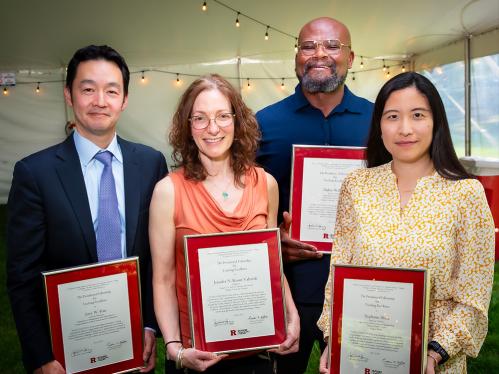Investing in Faculty Diversity at Rutgers
In 2021, Rutgers launched a Presidential Faculty Diversity Initiative to advance our institutional goals toward diversity, equity, and inclusion universitywide. A program for Accelerated Recruitment of Individual Faculty allows departments and programs to bring exceptional new faculty to Rutgers, in all fields. A Faculty Cluster Hiring program promotes the hiring of multiple faculty in four key priority areas of strength at Rutgers: Race, Racism, and Inequality, Health Equity, Advancing STEM Diversity, and Engaged Climate Action. And a Presidential Postdoctoral Fellows program gives promising scholars two years of mentored research and teaching and creates a pathway to a possible tenure-track appointment on a Rutgers campus.
A diverse faculty is a cornerstone of academic excellence. By reaching out far and wide to recruit and hire the most talented new faculty members and providing structures for support, mentoring, and professional advancement, our programs set in motion a self-reinforcing academic community that is committed to reducing isolation, fostering interdisciplinary collaboration, and advancing our mission of inclusive academic excellence.
Accordion Content
-
All appointments funded through the programs are intended to advance Rutgers’ institutional goals of building diversity, equity, and inclusive academic excellence, as outlined in our Diversity Strategic Plan. Diversity refers to the variety of personal experiences, values, and worldviews that arise from differences of culture and circumstance. Such differences include race, ethnicity, gender and gender identity, age, religion, language, disability status, sexual orientation, socioeconomic status, geographic region, and more.
-
Intentional mentoring and support of our faculty is an institutional responsibility, and all units, at all levels, who seek funding through the programs will be asked to demonstrate their commitment to mentoring, advancing, and retaining new colleagues. Guidance on best practices for inclusive hiring and resources for successful mentoring plans are available through faculty development offices in the offices of the chancellors and provosts on each campus, and through the Faculty Diversity Collaborative in the office of University Equity and Inclusion.
Investing in Faculty Diversity at Rutgers
There are three distinct programs designed to advance the mission of inclusive academic excellence through faculty hiring at Rutgers:

Frequently Asked Questions
-
Provosts and chancellors ultimately have responsibility for oversight and hiring of faculty to meet the university’s objectives. They can draw on their strategic resources to extend the impact of the hiring programs by hiring additional faculty, enhancing start-up packages, or using whatever means they deem appropriate to achieve institutional goals. They will work with their deans by engaging in dialogue about implementation and improvements to hiring processes, encouraging long-range budget planning in relation to timed supports (three years on average for permanent appointments), and by connecting campus resources to central mentoring and advancement supports.
-
Funds for faculty hiring will be set aside for each CLU at the beginning of each hiring cycle (June-July), with an indication of how these funds correlate across the four programs. Provosts and chancellors may use diversity funding strategically in whatever ways are most effective: for salary or for benefits support, for discretionary funds to faculty as a top-off to start-up packages, or as funds to provide protected time for scholarly activities. At the conclusion of successful recruitment of a faculty candidate, the provost will forward a post-hiring action report to the EVPAA, which will include materials about each candidate and a brief description of the search process demonstrating that it has been consistent with program goals. This report will trigger the release of funds.
-
Requests for cluster hires should be submitted by deans to their provosts, who will review them for strategic clarity and forward them in a ranked list to the EVPAA's office, which will make a final recommendation for funding. Thereafter, individual hires associated with cluster hire proposals will follow an internal approval process on the campuses, i.e. provosts’ approval will suffice to extend an offer to a candidate. At the conclusion of a successful recruitment of a faculty candidate, the provost will forward a post-hiring action report to the EVPAA, which will include materials about each candidate and a brief description of the search process demonstrating that it has been consistent with program goals. This report will trigger the release of funds.
-
In order to receive funding from the diversity hiring programs, deans should consult with their provosts about how the programs will fit strategically with their hiring plans. All requests for funds should be submitted to the provost's office with necessary accompanying materials. Provosts will review requests and either approve them at the campus level on a rolling basis (for accelerated individual hiring) or make ranked recommendations to the EVPAA (for cluster hiring).
-
Diversity refers to the variety of personal experiences, values, and worldviews that arise from differences of culture and circumstance. Such differences include race, ethnicity, gender and gender identity, age, religion, language, disability status, sexual orientation, socioeconomic status, geographic region, and more.
-
The programs will support active hiring for an initial three-year period, with total support extending over five years. At the end of the fiscal year, any concrete commitments made for future years will be rolled over; remaining unused funds will be returned to the EVPAA to be deployed in subsequent years. In their end-of-year summaries, provosts will have an opportunity to project needs and hiring plans for the following cycle. The EVPAA recognizes that successful diversity hiring can be difficult and that efforts must be supported continuously over multiple years.
-
Resources on best practices for hiring can be found in the Rutgers University Faculty Hiring Manual, which can be read online in accessible format or downloaded for reference.
-
The Faculty Diversity Collaborative in the Office of University Equity and Inclusion will provide additional resources and central coordination of Rutgers’ mentoring, advancement, and support programs.